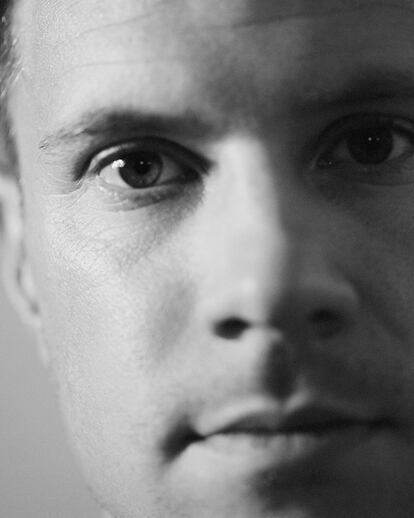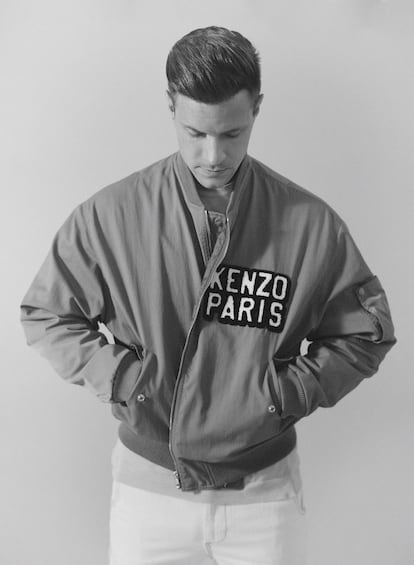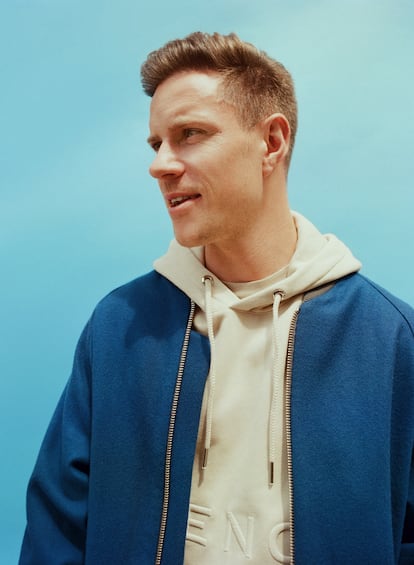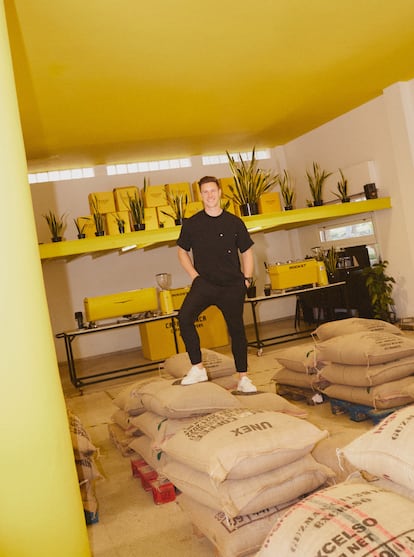Ter Stegen: ‘Piqué isn’t afraid of making mistakes. He calculates risk, but risk doesn’t make him think differently’
The German footballer is going for his tenth season as the goalkeeper for FC Barcelona. Last year, he was close to the unbeaten record. And today, he’s also thinking about a life beyond soccer


— Dad, I want to go on a train.
— You got it. One day, we’ll both take the train to Barcelona.
The conversation between a three-and-a-half-year-old boy and his father wouldn’t attract anyone’s attention on the streets of Castelldefels, a suburb of Barcelona, if it wasn’t between Ben and Marc ter Stegen – the goalkeeper for Barcelona FC.
“I cannot limit him, nor do I want to. If he wants to have that experience, perfect. I’ll be there to accompany him. You have to break out of the bubble, you can’t stay there forever,” Ter Stegen reflects. The 31-year-old German has been with his team for a decade.
Question: Do you often think about breaking out of the soccer bubble?
Answer: I think it’s important to do it. The life I had as a child is different from the one my son has. I traveled by public bus, by train. If I want to set a good example for my son, I have to try to make his life as normal as possible… if there’s such a thing as normality.
Q. Do the people in a player’s entourage prefer to keep them isolated?
A. Each agent has their own way of operating. Choosing a good one is difficult. The right people aren’t the ones who agree with you – the right people are the ones who make you think, the ones who make you see other points of view. When you start having important and interesting conversations with the people around you, that’s what makes you grow.
I think I’ve been lucky. My mother, my grandfather and my stepfather were very cautious when I was little – I had to choose the right agent. I was 15-years-old. I couldn’t make such a big decision. Today, I hear stories about agents that are astounding… about how they manipulate people. And the families [of footballers] aren’t prepared. Nobody is. Nobody teaches you how to handle all of this.
Q. By “all of this,” do you mean money and fame?
A. I’m speaking about everything in general. It’s also important to know what’s happening in the world. Why do the things that happen happen? You don’t have to know [if you’re a professional athlete]. When I left school, I wasn’t prepared. I was already playing in the youth leagues of my local team – Borussia Monchengladbach – and earning a lot of money for a youngster (he was 18-years-old in 2010). I lived with my parents, I had no expenses. Leaving home was important. I matured fast. I learned to pay my bills, to look for – as an example – health insurance.

Q. Do you still pay your own bills?
A. I do. I have people who advise me on important stuff, but I think that everyone has to manage these kinds of things [on their own]. Now, could I ask someone to do it for me? Yes. But that’s not reality. You cannot get away from reality, from the everyday things in life. If I let other people do everything for me, what will happen when I retire? There will no longer be people for everything.
Ter Stegen parks his truck a few feet away from the Café de Finca. He’s dressed in black and carries a pack of Moelk Company oat milk boxes in his hand – another one of his business ventures. He enters the specialty coffee shop and says hello to each of the staff members. He’s friendly, but a bit distant. “When I arrived in Barcelona, I liked coffee,” the goalkeeper explains.
Everything changed when he moved to Eixample, a central neighborhood. While his wife, Dani, was studying architecture, Ter Stegen found a hobby. “At first, I was interested in the brands of the coffee machines. Then, I started visiting different places, asking what kind of grinder they used… and I never stopped,” he recalls, while preparing a coffee. He takes his time, weighing the beans before placing them in the coffee maker. When he adds milk, he does so patiently, until a heart is drawn. “I like preparing [coffee], it relaxes me. I start every morning with the coffeemaker, while my wife makes breakfast. We enjoy the routine,” the German smiles.
Today, the goalkeeper’s taste for coffee has become a business. He recently invested in Café de Finca, his latest investment in Barcelona. He has also invested in Kleta: a start-up dedicated to renting out bicycles for personal use via a monthly subscription model.

Q. Is Gerard Piqué the example to follow for the footballer-entrepreneur?
A. Gerard isn’t afraid of being wrong. He calculates the risk, of course… but risk doesn’t make him think differently. You can always have people who can help you, people you can trust… but no matter how much a [business venture] is analyzed, there’s always a risk.
A footballer is prepared to be the best on the field, but not in business. We haven’t studied anything – we have no experience, either. So, what you have to do is prepare. I’ve started reading books. And that’s useful, but what makes the real difference is practice. You have to meet people, talk about [your business project]. Oftentimes, you’re guided by your gut. The product can be very good, but if you don’t do it with the right people, you’re going to fail. The first thing I do is discuss it with the people who advise me and then with the lawyers. Most of the time, I discover things that I never knew before. It can go wrong, yes, but the experience will always stay with me.
Q. Do you envision your future away from football?
A. Whatever I’m going to do in the future – whether or not it’s linked to the world of football – it will always allow me to understand human relationships. That’s why I find all this [business activity] very interesting. I see what people are like, how they work, what types of personalities do well working together, what types don’t. Football has taken up a big part of my life. There will be a time when I need to do other things.
Last season – when Barcelona had gone two years without winning a title – Xavi Hernández led the team to win La Liga and the Spanish Super Cup. But this wouldn’t have been possible without Ter Stegen, who won his first Zamora Award, after keeping a clean sheet on 26 occasions and conceding just 18 goals throughout the season.

Q. What changed during the last season?
A. Each person played an important role, but it was the team as a whole that did it. In many games, we finished with very good feelings, feelings that we hadn’t had the previous year. Above all, we had this feeling that it was very difficult to surpass ourselves.
It’s important to keep a clean sheet. When you know that [the other team] won’t score on you, you’re calm. We’re always going to score a goal. We also knew how to suffer – as Atlético did – for many years.
Q. And what changed for you on a personal level?
A. I really did the same old thing. I’ve worked in the same way with [José Ramón de la Fuente, Barcelona’s goalkeeping coach]. We analyze the matches in the same way and we prepare in the same way. There are moments in a player’s career that are good… others, not so good. The important thing is that you’re getting better over the course of your career.
Q. Were you worried about not being among the best goalkeepers in the world?
A. It depends a lot on what happens in the Champions League. If your team goes far, you’re always among the top three or five in the world. That’s the new reality. You cannot fall in the Champions League and still be among the top three. That’s what the fans feel – it doesn’t matter if it’s true or not. There are goalkeepers such as [Jan] Oblak, for example, who didn’t reach the Champions League semi-finals, but still had a spectacular season.
Q. What’s your understanding of leadership?
A. You have to be there in hard times. In good times, everyone can step up. It’s natural. But to hang on in the hard times, you have to have gone through bad experiences. You can trust the players who have gone through delicate moments. You cannot expect Gavi or Pedri – who are very good footballers, but have only been playing for a short time – to lead the team at a difficult time. In five years, this will change. Look at the case of Frenkie [de Jong]. He’s [only 26] and has already been through tough times. These are the [young guys] we need to take a step forward.

Q. Did you learn more from the 2-8 loss against Bayern than from the 3-1 victory against Juve?
A. Both were important. [The loss against] Bayern was very painful – very important to grow as a person. The moment was so hard that you had to get back up and take a step forward. If you don’t, you’re not made for a team like Barça. And we have players who have done just that: they’ve grown despite the tough situations.
Q. Is it possible to enjoy playing defense?
A. Of course! But you have to learn to enjoy defending. If people think it’s not their style, they’re wrong. Soccer is all about defending and attacking. And doing everything as a team. That interests me a lot – living the game together. The importance of the collective.
Q. Isn’t that a very German trait?
A. In Germany, we have good footballers, very good ones; but people pay more attention to the collective. It’s true, it’s very German. We don’t want anyone to leave the formation. Winning as a team has a lot of value.
Sign up for our weekly newsletter to get more English-language news coverage from EL PAÍS USA Edition
Tu suscripción se está usando en otro dispositivo
¿Quieres añadir otro usuario a tu suscripción?
Si continúas leyendo en este dispositivo, no se podrá leer en el otro.
FlechaTu suscripción se está usando en otro dispositivo y solo puedes acceder a EL PAÍS desde un dispositivo a la vez.
Si quieres compartir tu cuenta, cambia tu suscripción a la modalidad Premium, así podrás añadir otro usuario. Cada uno accederá con su propia cuenta de email, lo que os permitirá personalizar vuestra experiencia en EL PAÍS.
¿Tienes una suscripción de empresa? Accede aquí para contratar más cuentas.
En el caso de no saber quién está usando tu cuenta, te recomendamos cambiar tu contraseña aquí.
Si decides continuar compartiendo tu cuenta, este mensaje se mostrará en tu dispositivo y en el de la otra persona que está usando tu cuenta de forma indefinida, afectando a tu experiencia de lectura. Puedes consultar aquí los términos y condiciones de la suscripción digital.








































